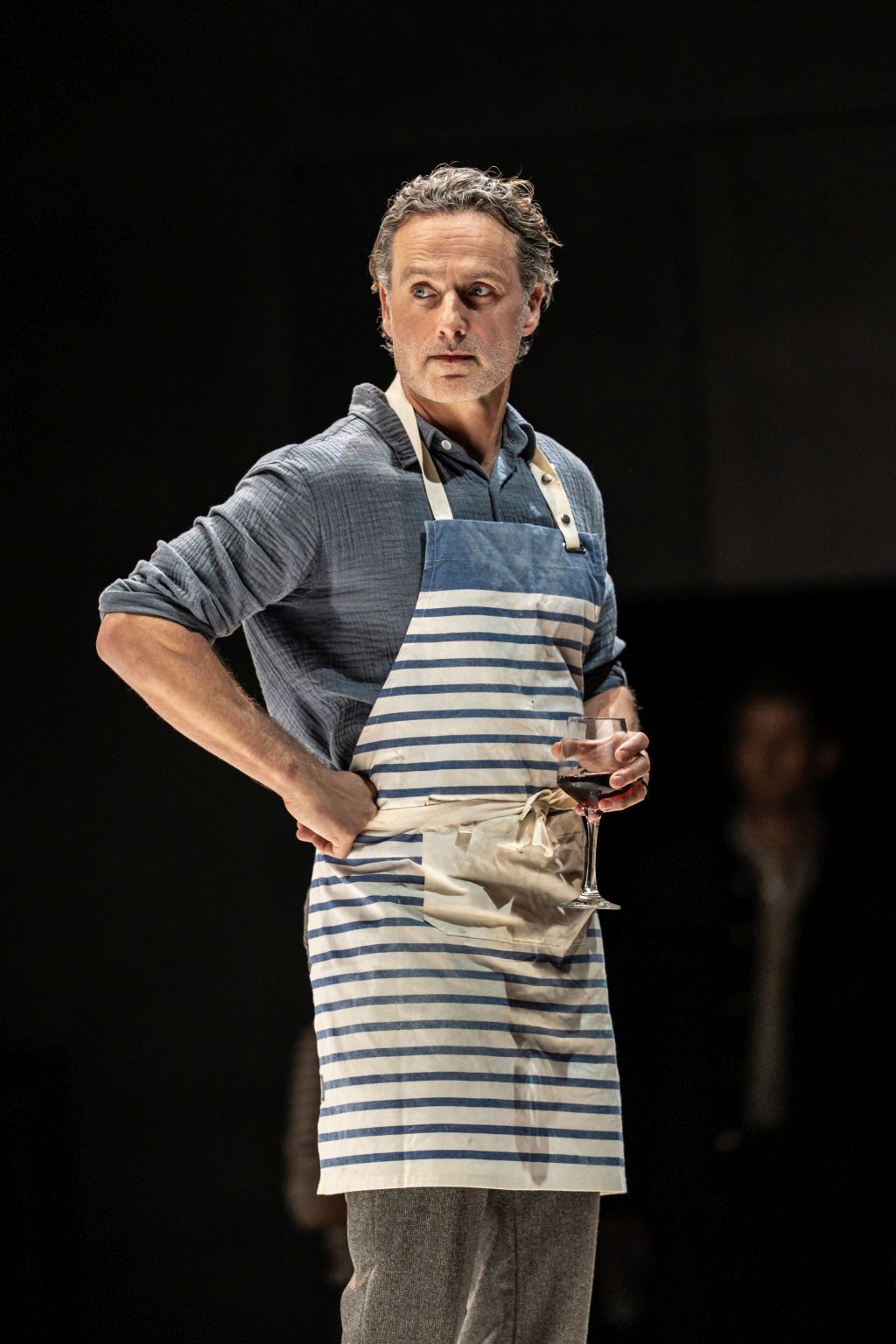The Lady from the Sea, Bridge Theatre review - flashes of brilliance | reviews, news & interviews
The Lady from the Sea, Bridge Theatre review - flashes of brilliance
The Lady from the Sea, Bridge Theatre review - flashes of brilliance
Simon Stone refashions Ibsen in his own high-octane image

Like the lighting that crackles now and again to indicate an abrupt change of scene or mood, Simon Stone's version of The Lady from the Sea is illuminated by the sense of adventure and excitement one has come to expect from this singular artist. That's the case even if the cumulative effect falls short of his devastating achievements with the National Theatre's Phaedra or, before that, Billie Piper in Yerma.
Moment by moment, the play arrestingly repurposes Ibsen's mystical 1888 play for today, and not only because the text makes reference to OnlyFans, Brooklyn Beckham, and Beyoncé (to pick just a few cultural touchstones) and grants Alicia Vikander's riven Ellida – the unaristocratic "lady" of the title – a degree of agency in her final moments of which one feels the author of A Doll's House would have approved.
 But the Ibsen title to some degree is a red herring, if only because Stone pushes the original in unexpected directions. Indeed if the ownership inherent in the title My Master Builder attached to the dreadful Ibsen rewrite on the West End earlier this year hadn't just recently been used, this could as easily be called My Lady from the Sea. That's to say, you're unlikely to see another treatment of this play quite like it.
But the Ibsen title to some degree is a red herring, if only because Stone pushes the original in unexpected directions. Indeed if the ownership inherent in the title My Master Builder attached to the dreadful Ibsen rewrite on the West End earlier this year hadn't just recently been used, this could as easily be called My Lady from the Sea. That's to say, you're unlikely to see another treatment of this play quite like it.
The opening, for instance, deliberately wrongfoots you, Lizzie Clachan's initially gleaming, antiseptic set in no way indicative of what will follow. The conversation, too, feels as if we've wandered into some sort of country estate worthy of Tom Stoppard, with two cultured, cultivated gentlemen – Andrew Lincoln's Edward and, in the performance of the evening, Joe Alywn's Heath (pictured above) – tossing poetic shards back and forth. In fact, this seemingly idyllic Lake District retreat from which Edward, a doctor, carries out his practice is by no means immune to pain. Not only is Heath – this play's equivalent to the sculptor Lyngstrand, from the original – soon revealed to be terminally ill. Edward's composure will itself crack open once Ellida, his second wife, is reacquainted with a seminal figure from her past which sends the stage plunging into darkness as the set, after the interval, turns to an elongated pool of inky, seductive black.
Stone likes to cobble his writing in place in conjunction with the cast (one feels a kinship of sorts with Mike Leigh in that regard), and you feel at once the ease with which this company takes to their characters – in itself no mean feat given that two of its three name performers, Vikander and Alwyn, are here making their professional debuts. There's a quiet confidence to Lincoln's Edward that looks sure to come undone, just as Vikander's demure-seeming Ellida – far smaller in stature than this role is usually cast – will detonate from within when confronted with the reappearance of the older Finn (the splendid Brendan Cowell, an alum of Yerma). A defining erotic figure from her adolescence, this man who has done prison time for murder takes eerie possession of Edward's home and just may achieve the same result with Edward's wife as well.
 Complicating the nexus of affections yet further are a smooth-spoken neurosurgeon, Lyle (John Macmillan), and Edward's two daughters from his first marriage to a Black woman who committed suicide. The presence of the sassy Hilda (a faintly tiresome Isobel Akuwudike) and the Yale-bound Asa (Gracie Oddie-James, terrific) might matter less to their gatheringly neurotic stepmother were it not revealed that Ellida has herself suffered a miscarriage, so these children pose an ongoing reminder of what she has in her own life with Edward not achieved.
Complicating the nexus of affections yet further are a smooth-spoken neurosurgeon, Lyle (John Macmillan), and Edward's two daughters from his first marriage to a Black woman who committed suicide. The presence of the sassy Hilda (a faintly tiresome Isobel Akuwudike) and the Yale-bound Asa (Gracie Oddie-James, terrific) might matter less to their gatheringly neurotic stepmother were it not revealed that Ellida has herself suffered a miscarriage, so these children pose an ongoing reminder of what she has in her own life with Edward not achieved.
"Everyone has their tragedies," Edward remarks at one point, and the play charts a neat journey from apparent civility to primal rage, the choice of the name Heath hugely apposite, one feels, to a psychic landscape in which several of the characters are reduced in their own ways to Lear's fury on his own heath. Fun is had with language – words like dolt, nincompoop, and skedaddle will all resonate for me for some while having heard their use in this play. But as is per Stone's norm, his actual terrain is the psychic terror that lies beyond language as we attempt to collate the past and present and allow them in turn to form a future which may itself be threatened, as is Heath's, by a diagnosis age 28 of ALS.
I'd heard reports aplenty that Vikander wasn't easily heard during previews, but, now visibly amplifed, she sounded fine to me from, admittedly, a ringside seat within the same Bridge configuration that was deployed for Richard II at this address. More to the point, the Oscar winning Swede has given herself over entirely to the mettlesome demons of a woman who left home age 10 and is shattered when the safe haven she has found with Edward is itself shaken to its core. (Besides, how safe is she given her resistance to medication in the face of a husband whose career is about dispensing – possibly overly so – that very thing.)
Much of the second act takes place in, and under (!), the water, so you're right to expect the production itself to plumb the ever-unpredictable new depths chosen by the characters. In fact, it slackens just when it needs most to itensify, and I couldn't help but feel as if a running time notably shortened early in the run might have led to the elimination of scenes needed for greater emotional amplitude.
Still, taken across the better part of three hours, the evening consistently intrigues, not least when Finn, his demeanour dashed by the imminence of death, quotes Philip Larkin's famous poem about parentage only to reveal the living death he experenced growing up in an emotionless household with a father who only smiled twice and a mum who thought her son was attractive, yes, but lacked charisma. In such firm voice that you would assume the stage to be his natural habitat, Alwyn turns this supporting role into a quietly searing study in psychic damage: come for the waterlogged lady of the title, and you may be most swept up by the quietly poleaxed posh boy who's not long for this land.
- The Lady from the Sea at the Bridge Theatre to 8 November
- More theatre reviews on theartsdesk
rating
Share this article
The future of Arts Journalism
You can stop theartsdesk.com closing!
We urgently need financing to survive. Our fundraising drive has thus far raised £49,000 but we need to reach £100,000 or we will be forced to close. Please contribute here: https://gofund.me/c3f6033d
And if you can forward this information to anyone who might assist, we’d be grateful.

Subscribe to theartsdesk.com
Thank you for continuing to read our work on theartsdesk.com. For unlimited access to every article in its entirety, including our archive of more than 15,000 pieces, we're asking for £5 per month or £40 per year. We feel it's a very good deal, and hope you do too.
To take a subscription now simply click here.
And if you're looking for that extra gift for a friend or family member, why not treat them to a theartsdesk.com gift subscription?
more Theatre
 The Code, Southwark Playhouse Elephant review - superbly cast, resonant play about the price of fame in Hollywood
Tracie Bennett is outstanding as a ribald, riotous Tallulah Bankhead
The Code, Southwark Playhouse Elephant review - superbly cast, resonant play about the price of fame in Hollywood
Tracie Bennett is outstanding as a ribald, riotous Tallulah Bankhead
 Reunion, Kiln Theatre review - a stormy night in every sense
Beautifully acted, but desperately grim drama
Reunion, Kiln Theatre review - a stormy night in every sense
Beautifully acted, but desperately grim drama
 The Lady from the Sea, Bridge Theatre review - flashes of brilliance
Simon Stone refashions Ibsen in his own high-octane image
The Lady from the Sea, Bridge Theatre review - flashes of brilliance
Simon Stone refashions Ibsen in his own high-octane image
 Romans: A Novel, Almeida Theatre review - a uniquely extraordinary work
Alice Birch’s wildly epic family drama is both mind-blowing and exasperating
Romans: A Novel, Almeida Theatre review - a uniquely extraordinary work
Alice Birch’s wildly epic family drama is both mind-blowing and exasperating
 The Producers, Garrick Theatre review - Ve haf vays of making you laugh
You probably know what's coming, but it's such great fun!
The Producers, Garrick Theatre review - Ve haf vays of making you laugh
You probably know what's coming, but it's such great fun!
 Not Your Superwoman, Bush Theatre review - powerful tribute to the plight and perseverance of Black women
Golda Rosheuvel and Letitia Wright excel in a super new play
Not Your Superwoman, Bush Theatre review - powerful tribute to the plight and perseverance of Black women
Golda Rosheuvel and Letitia Wright excel in a super new play
 Cow | Deer, Royal Court review - paradox-rich account of non-human life
Experimental work about nature led by Katie Mitchell is both extraordinary and banal
Cow | Deer, Royal Court review - paradox-rich account of non-human life
Experimental work about nature led by Katie Mitchell is both extraordinary and banal
 Deaf Republic, Royal Court review - beautiful images, shame about the words
Staging of Ukrainian-American Ilya Kaminsky’s anti-war poems is too meta-theatrical
Deaf Republic, Royal Court review - beautiful images, shame about the words
Staging of Ukrainian-American Ilya Kaminsky’s anti-war poems is too meta-theatrical
 Laura Benanti: Nobody Cares, Underbelly Boulevard Soho review - Tony winner makes charming, cheeky London debut
Broadway's acclaimed Cinderella, Louise, and Amalia reaches Soho for a welcome one-night stand
Laura Benanti: Nobody Cares, Underbelly Boulevard Soho review - Tony winner makes charming, cheeky London debut
Broadway's acclaimed Cinderella, Louise, and Amalia reaches Soho for a welcome one-night stand
 The Pitchfork Disney, King's Head Theatre review - blazing with dark energy
Thrilling revival of Philip Ridley’s cult classic confirms its legendary status
The Pitchfork Disney, King's Head Theatre review - blazing with dark energy
Thrilling revival of Philip Ridley’s cult classic confirms its legendary status
 Born with Teeth, Wyndham's Theatre review - electric sparring match between Shakespeare and Marlowe
Rival Elizabethan playwrights in an up-to-the-minute encounter
Born with Teeth, Wyndham's Theatre review - electric sparring match between Shakespeare and Marlowe
Rival Elizabethan playwrights in an up-to-the-minute encounter
 Interview, Riverside Studios review - old media vs new in sparky scrap between generations
Robert Sean Leonard and Paten Hughes make worthy sparring partners
Interview, Riverside Studios review - old media vs new in sparky scrap between generations
Robert Sean Leonard and Paten Hughes make worthy sparring partners

Add comment